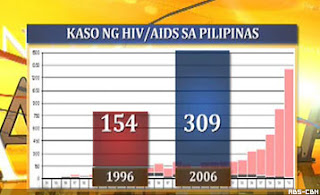The condom controversy
Dr Esperanza Cabral said that in 2011 the government stopped allocating funds in the distribution of condoms due to pressure from the Catholic Church. Condoms are known to effectively stop the spread of HIV and other STD infections. Dr. Cabral was once castigated by the Catholic Church for distribution of condoms on valentines day.
Condoms against morality?
“Using condoms is an offense against God. If you are abstinent and faithful, hindi ka magkaka-AIDS,” said Fr. Joel Jason, head of the Archdiocese of Manila’s Commission on Family and Life.
The Church is firm with their stand against the use artificial means of contraception.Facts about HIV
What is HIV?
HIV stands for 'human immunodeficiency virus'. HIV is a virus (of the type called
retrovirus) that infects cells of the human immune system (mainly CD4 positive T cells
and macrophages—key components of the cellular immune system), and destroys or
impairs their function. Infection with this virus results in the progressive deterioration of
the immune system, leading to 'immune deficiency
What is AIDS?
AIDS stands for 'acquired immunodeficiency syndrome' and is a surveillance definition
based on signs, symptoms, infections, and cancers associated with the deficiency of the
immune system that stems from infection with HIV.
How is HIV transmitted?
Through:
- Unprotected sex (vaginal, anal and to a lesser extent oral sex) with an infected person
- Sharing contaminated syringes, needles or other sharp instruments
- From mother to child during pregnancy, childbirth or breast feeding when the mother is already HIV positive
- Blood transfusion with contaminated blood
- All these ways of transmitting HIV can be prevented
For more info on HIV prevention visit the following links
CDC ( Center for Disease Control)
D.O.H HIV surveillance


